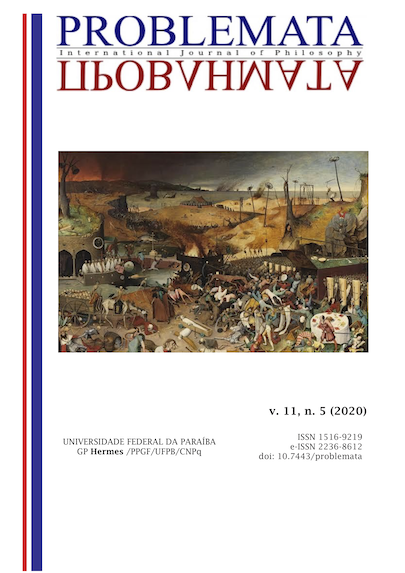SENTIMENTS AND UTILITY:
AN INVESTIGATION OF MORAL IN HUMEAN BASES
DOI:
https://doi.org/10.7443/problemata.v11i5.52093Keywords:
Sentiments, Reason, Utility, Benevolence, JusticeAbstract
The article main purpose is to develop an argument concerning the central problem of Hume's practical philosophy. The initial approach consists in determine the influence that reason and sentiments have on how moral judgments are ordinarily made. It will be argued that the base of moral distinctions is found in sentiments, with reason having an instrumental role in the process. In order to explain which principle offers a north to sentiments and is the moral compass of individuals, the second point developed in this article converges to investigating moral sentiments and utility from the humean argument about the natural virtue of benevolence and the artificial virtue of justice. To answer these questions, the argument will be grounded essentially on the Investigations on the Principles of Morals, using the Treatise of Human Nature and Hume’s commentators when is necessary to reinforce or clarify a specific point.
Downloads
References
AYER, A. J. 2003. Hume. São Paulo: Loyola.
BRITO, A. N. 2001. Hume e o empirismo na moral. Philósophos, Goiânia, v.6, n. 1 e 2, p.11-25.
HUME, D. 2000. Tratado da natureza humana: uma tentativa de introduzir o método experimental de raciocínio nos assuntos morais. Traduzido por Débora Danowski. São Paulo: Unesp.
________. 2004. Investigações sobre o entendimento humano e sobre os princípios da moral. Traduzido por José Oscar de Almeida Marques. São Paulo: Unesp.
________. 2004b. Ensaios morais, políticos e literários. Tradução de Luciano Trigo. Rio de Janeiro: Topbooks.
QUIGLEY, C. 2006. Modern Mummies: the preservation of the human body in the twentieth century. Carolina do Norte: McFarland.
SCHNEEWIND, J. B. 2001. Hume e a virtude naturalizada. In: Schneewind, J. B. A invenção da autonomia: uma história da filosofia moral moderna. Traduzido por Magda França Lopes. São Leopoldo, Unisinos, p. 389-413.
SCHNALL, S.; HAIDT, J.; CLORE, G. L.; & JORDAN, A. H. 2008. Disgust as embodied moral judgment. Personality and Social Psychology Bulletin, n. 34, pp. 1096–1109.
SILVA, A. L. O. & BRITO, A. N. 2007. Utilidade e simpatia: Hume contra o egoísmo cético. Controvérsia, v. 3, n. 1, p. 22-29.
STROUDT, B. 1977. Hume. London: Routledge.
Downloads
Published
Issue
Section
License
Authors who publish with this journal agree to the following terms:
- Authors retain copyright and grant the journal right of first publication with the work simultaneously licensed under a Creative Commons Attribution License that allows others to share the work with an acknowledgement of the work's authorship and initial publication in this journal.
- Authors are able to enter into separate, additional contractual arrangements for the non-exclusive distribution of the journal's published version of the work (e.g., post it to an institutional repository or publish it in a book), with an acknowledgement of its initial publication in this journal.
-
- Authors are permitted and encouraged to post their work online (e.g., in institutional repositories or on their website) prior to and during the submission process, as it can lead to productive exchanges, as well as earlier and greater citation of published work (See The Effect of Open Access).





